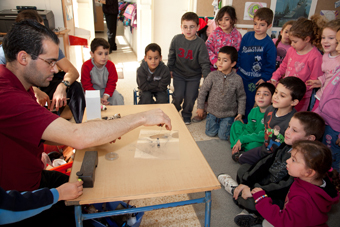Scientific Cause for Concern
Permanent link All Posts
MadaTech scientist taking part providing a lesson with a classroom in Northern Israel.
Israeli institutes of higher education such as Hebrew University and University of Tel Aviv are considered to be some of the finest learning centers in the world. People think of Israel as the “Start-Up Nation,” the Middle Eastern innovator, and a leader in science, medicine, and business. And while these are all true, not many realize the very serious problems and deterioration of the Israeli primary education system.
As a pro-Israel advocate, both professionally and in the writing world, I am troubled most by the Israeli education system’s lack of focus and urgency in the sciences. For Israel to keep its regional qualitative edge over its hostile neighbors, and to keep developing as global innovators, excelling in the sciences at all grade levels is crucial.
A 2010 report printed by the Taub Center, an Israeli social policy think-tank, stated that some 48% of middle school students have less than two hours of weekly science education. Further, much of the time, the science education they are receiving is inadequate. A 2010 report published by the Knesset Research and Information Center on poverty and scholastic achievements included a survey that indicated 30% of Jewish students in elementary schools require private tutors. To make things worse, the report found notable gaps in terms of access to private tutoring services between students from financially stable towns and those from the periphery.
Professor Ofra Mayseless, the dean of the Education Faculty at the University of Haifa (where I spent my amazing year abroad in college) and chairwoman of the Forum of School Leaders for Education in Israel, told Haaretz that, “[t]he inclination towards private lessons stems mainly from the fact that teachers have a hard time teaching, and, in practice, a large part of class time is dedicated to addressing disciplinary problems and not to teaching," According to Mayseless, this has prompted teachers to relinquish responsibility for their students' know-how and education.
"In light of these difficulties, many of the teachers in Israel have lost their joy of teaching. They dedicate less of themselves to the student. Instead of the education system focusing on increasing students' curiosity and motivation to learn, there is a growing tendency for students to study and memorize the material only for the exam, and not to enrich their knowledge," she said.
Dani Ben-David, the Taub Center Executive Director, told Haaretz that, "[t]here are many parents today who have grown exasperated with the education system which, according to them, doesn't deliver the goods. Therefore, they are searching for alternative solutions." There are organizations that have risen to the challenge and need. The Israel National Museum of Science, Technology and Space (MadaTech in Hebrew), located in Haifa has stepped up in a big way.
The Museum is one of Israel’s three largest with over 600 exhibits. But it is its education outreach, which consists of over 200,000 Israeli children K-12, that makes it truly special. Its facilities constitute 25 laboratories, seven learning centers, and three mobile laboratory vans. Among its programs geared to strengthen students’ interest in science, the Israel Museum of Science annual science competition fosters creative and analytical thinking among Israel’s eighth and ninth-grade students. Thousands take part in the yearlong OlympiYeda Science Competition that culminates in a two-week science camp in Haifa, Israel. The summer camp includes an enriched science curriculum with guest lecturers, visits to technological facilities, and scientific activities. The 2010 competition focused on Robotics and in 2011 on sports and health.
The Museum also caters to peripheral communities, something the Israeli government should take note of. According to Dr. Ronen Mir, the Israel Museum of Science General Director, around 40% of the museum’s visitors are Arab, and 40% of its instructors are also Arab. Operation North for Arabic Speakers provides advanced science learning opportunities for Israeli-Arab junior high students. Led by prominent Israeli-Arab researchers, the program educates students on basic tenets of bio-medicine, genetics, nanotechnology, and astrophysics. There are similar programs for soviet immigrants, Ethiopians, and young girls. The Museum’s programs are designed to nurture a love of science in participants from a variety of backgrounds, foster coexistence and respect for diversity among Israel’s population, and promote the pursuit of science education and professions.
Equally important as helping the students, the Israel Museum of Science helps educate the teachers, providing them with instruction, materials, and inspiration.
More organizations in Israel need to undertake activities commensurate with the Israel National Museum of Science. I know it’s easier said than done; fundraising to produce such services is difficult, especially in this economic climate. But the attempt must be made. As a Jew, what makes me proud to have Israel as our homeland is its rapid development and adaptability in the most complex scientific fields, which in turn allows it to make significant contributions to the world; all in the wake of serious adversity and hostility. Studies and testimony suggest, however, that this source of pride may be taking a turn for the worst, starting with the Israeli youth. Both Israelis and Jews around the world need to come together to ensure that this trend is reversed, for all our sakes.



.jpg)



